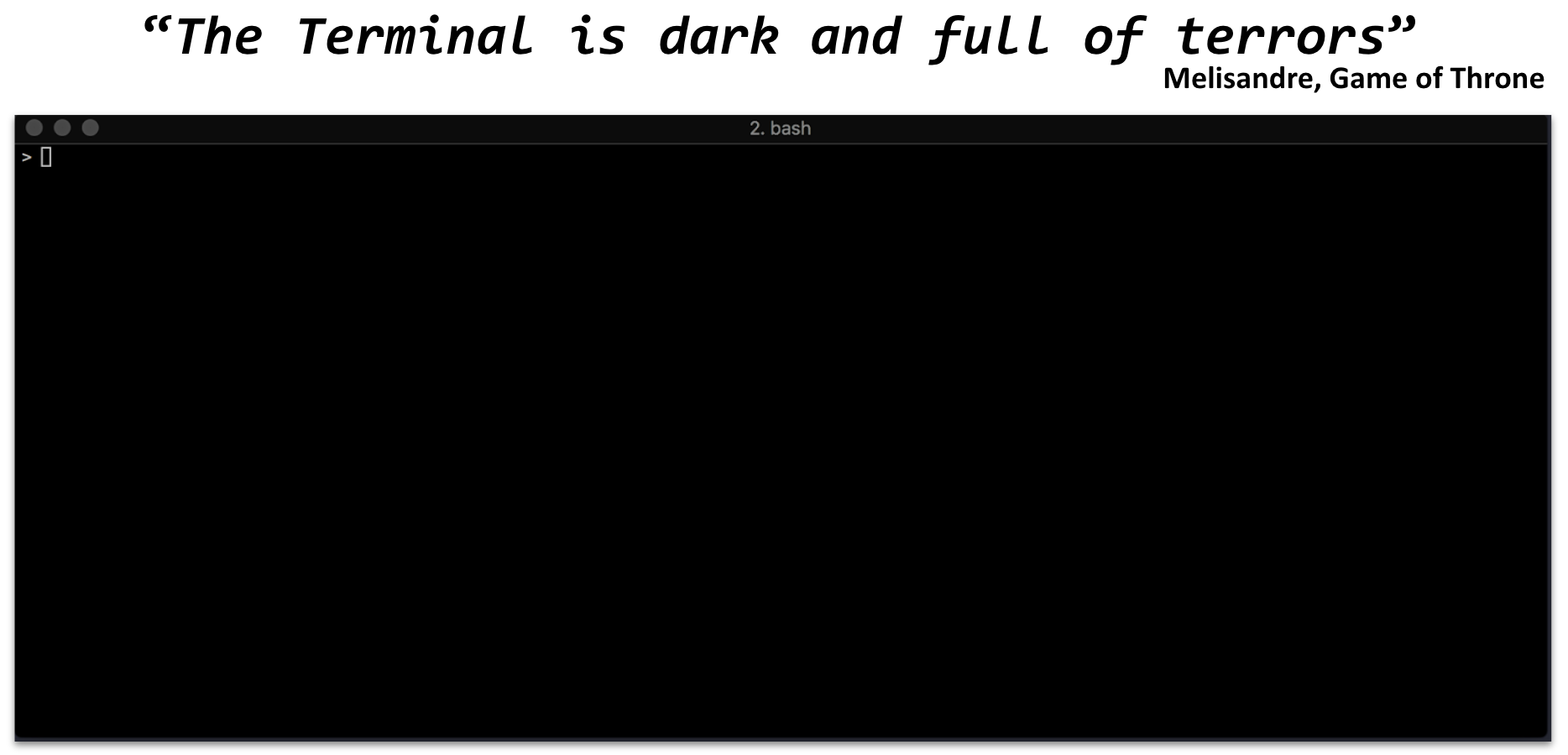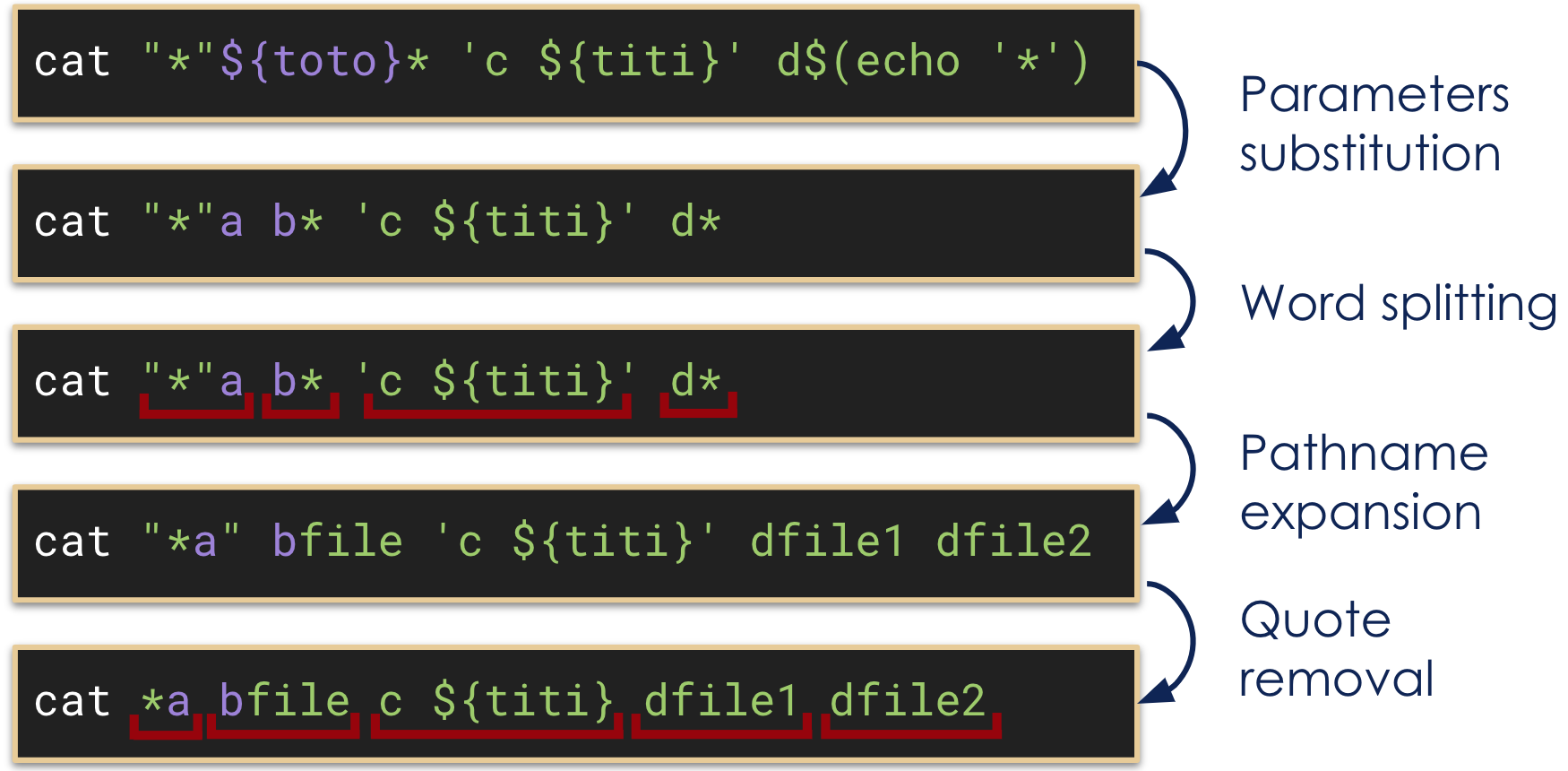Introduction to bash and tame your Terminal and play with basic shell scripts
| Command | Description |
|---|---|
| CTRL+a | Go to the beginning of the line |
| CTRL+e | Go to the end of the line |
| Alt+b / Alt+← | Move one word backward |
| Alt+f / Alt+→ | Move one word forward |
| CTRL+w / ⌘+Delete | Delete one word backward |
| CTRL+k | Delete until end of the line |
| CTRL+u | Delete until beginning of the line |
Disclaimer: some of commands can be different depend on the OS or Bash
- Switch to infinite history!
# In your bashrc
# Enable infinite history
export HISTSIZE=
export HISTFILESIZE=- Recall your commands!
| Command | Description |
|---|---|
| CTRL+p | Recall the previous command in the history |
| CTRL+n | Recall the next command in the history |
| CTRL+r | Do a search in your history |
- Enable advanced completion
# On Mac OS X
brew install bash-completion
# On Linux (Debian/Ubuntu)
apt-get install bash-completion`This wildcard symbol * will be replaced by all matching elements
# List all png files:
ls *.png
# List all files that contains report
ls *report*
# List both png and gif files
ls *.{png,gif}
# List all zip part files
ls archive-part[a-z].zipPipes let you use the output of a command as the input of another one.
- You can pipe as many command as you want
# count number files/folders
ls -1 | wc -l
# list only 'static' files/folders
ls -l | grep 'static'Exercice: Count how many pdf file and put it into a file
This value is referred to as an exit code or exit status. On POSIX systems the standard convention is for the program to pass 0 for successful executions and 1 or higher for failed executions
# Print success exit code 0.
ls
README.md static
echo $?
0
# Print failed exit code 127
command-not-found
command not found: command-not-found
echo $?
127You can chain command one after the other here's different type of operators
;Execute command sequentially
# list current file and then read space disk
ls -l ; df -h&&Execute command sequentially if the previous one is a success
# For ubuntu update packages and if the first command succeed then upgrade packages
apt-get update && apt-get upgrade||Execute next command if the previous one is a failure
# Ping octo website and if not succeed create test folder
ping octo.com || mkdir test!Execute all except the condition provided
# Delete all files in current directory expect html files
rm -r !(*.html)- Classic
# Launch a command in the background
command &
# Put foreground the last command in background
fg
# Put in the background the currently paused process
bg- Alternative
# use "screen"
screen
my-long-commandPress CTRL+a+d to put in background
# Create as many screen as you want and list them
screen -ls
# Reattach to a screen
screen -r PID- useful command
| Command | Description |
|---|---|
| CTRL+c | Try to stop the current process |
| CTRL+z | Pause the current process |
- Double quotes protect from word splitting and pathname expansions
# Display the content of a file named "a b*"
cat "a b*"- Single quotes protect from everything
# Display the content of a file named "${toto}" (no variable substitution)
cat '${toto}'There are 3 descriptors, stdin for input, stdout for output and stderr error output (std=standard).
Basically you can:
- redirect stdout to a file
- redirect stderr to a file
- redirect stdout to a stderr
- redirect stderr to a stdout
- redirect stderr and stdout to a file
- redirect stderr and stdout to stdout
- redirect stderr and stdout to stderr
For command line 1 represents stdout and 2 stderr.
# list current files and put it into a file
ls -l > ls-l.txt
# redirect stderr in errors.log
my-command 2> errors.log
# look for all content with 'da' and redirect the result to stderr
grep da * 1>&2
# delete files finishing by core and redirect all output to nowhere, means wipe the output
rm -f *core &> /dev/nullfind: recursively search for filesgrep: search for text in standard input or filesawk/sed/tr: text/lines/character manipulationxargs: use output as arguments of another commandsort: sort lines numerically or alphabetically on the given fielduniq: exclude contiguous duplicate lineswc: count words, lines, bytes…head/tail: display beginning/end of files or standard inputdate: display the current or given date with the given format
Build your script to help you automate
# Variable assignement
toto="tutu"
# Variable reference
echo "${toto}"
# Or boolean logic
command1 || command2
# And boolean logic
command1 && command2
# command1 then command2
command1; command2
# Capture command output
titi=$(command1)if elsestatement
if command; then
do_this
elif other_command; then
do_that
else
do_something_else
fi - switch
case
case ${option} in
-h) display_help;;
-*) error "bad_option";;
*) error "unknown argument";;
esac- loop using
for
for var in 1 2 3 4 5; do
echo ${var}
done- loop using
while
while command; do
do_it || break
done# Display string
echo "Hello World"
# Make variable TOTO available to sub-processes
export TOTO=titi
echo $TOTO
# display titi
# Execute shell instruction in file toto.sh
source toto.sh
# Interpret the given arguments as new shell command to execute
eval $TOTO=\$TITI
# Read standard input next line and put it in variable TOTO
read -r TOTO
# Test VAR1 is defined and greater than 13
[ -n "$VAR1" ] && [ "$VAR1" -gt 13 ]$1,$2,$3...: arguments passed to function or scripts$#: number of arguments passed to function or scripts$@: all arguments$$: current PID (process id) of the running shell$?: exit code of the last command$!: PID of last background process$RANDOM: random number between 0 and 32767
- The lost variable
# Always print SUM=0
SUM=0
cat file | while read -r SUM; do
SUM=$((SUM + 1))
done
echo -- "SUM=${SUM}"- The input vaccum cleaner
# Stop after first hostname!
while read HOSTNAME; do
ssh "${HOSTNAME}" "command"
done < list_of_hosts.txt- The dangerous replace
# Doesn’t work if VAR
# contains slashes
sed -e "s/VAR/${VAR}/g” \ file- Argument with space inside
# Doesn’t work if arg has space
for arg in $@; do
cat "${arg}"
done- Initial state
Variables: toto="a b" titi="file"
Local files: filea, bfile, cfile, dfile1, dfile2
- What happens when we execute this line?
cat "*"${toto}* 'c ${titi}' d$(echo '*')- Use tldr to quickly grasp how to use them
brew install tldr
tldr sed- Use man to understand them in depth
man sedLet's start some hands-on
Create a shell one-liner that lists the top 10 of the files bigger than 1G under the /usr folder with at least the full path name and the file size.
Bonus: if file size is displayed in human readable format (2.4G, 54k, 12M...)
Helps:
- use
findand look for options - use
-execfindoption to display details - for mac user use
gsortinstead ofsort- install command:
brew install coreutils
- install command:
Create a shell one-liner that display files older than 1 month in the current folder and compresses them silently with tar.
Bonus: if compression is done in parallel and if bigger files are compressed first.
Helps:
- use
-mtimeoption - use
xargsto get the output
Write a shell script that display the list of comedy movies that were released between 4 and 3 months ago and that have more than 8 of average score.
Info:
- Documentation URL:
https://www.themoviedb.org/documentation/api/discover - API Key:
eecc946ec5ea05d0f35c9f842e8142a2 - Example API Call:
https://api.themoviedb.org/3/discover/movie?primary_release_date.gte=2014-09-15&primary_release_date.lte=2014-10-22&api_key=eecc946ec5ea05d0f35c9f842e8142a2
For inspiration for this tutorial (Ok it's more than inspiration...)


